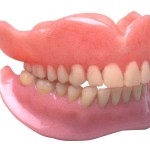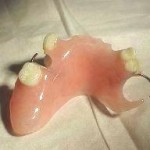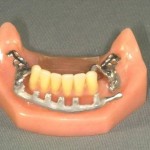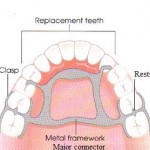Getting used to dentures may seem daunting at first, but after a little practice, using and caring for your dentures will seem like second nature. Whether you use adhesives to hold your upper, lower, or both sets of dentures in place is purely a personal choice. If you do use denture adhesives, learning to remove your dentures is one of the denture-wearing skills you’ll quickly master with just a little practice. Within a week you’ll be a seasoned pro. Continue reading
Category Archives: Denture Cares
How to Clean Ceramic Teeth
The process of using ceramic materials to replace or repair teeth is not new. According to the Indiana University School of Dentistry, the first porcelain denture tooth was introduced in 1789. Of the materials used today for tooth restoration, ceramic porcelain comes closest to duplicating the color and translucency of natural teeth. Ceramic teeth are, however, more expensive than other materials and can add up to a major investment. Protect your investment and help your ceramic teeth last longer by cleaning them properly. Continue reading
Swing Lock Partial Dentures
The swing-lock removable partial denture (SL), was introduced by Simmons in the early 1960s. Swing lock partial dentures are designed for dental patients who have depleted dentition. They are sometimes used because traditional partial dentures can be unreliable due to rather limited bracing and clasping abilities. These limitations result in a weak resistance to rotational forces. To overcome this problem, the swing lock partial denture design makes it possible to clasp multiple teeth at a time, therefore increasing the bracing and reduce the rotational movements of the denture. Continue reading
What Are the Dangers of Denture Creams?
If you’re one of the 35 million Americans who wear dentures, take note — your denture cream could be putting your health at risk. Researchers have recently discovered a link between the zinc in denture adhesives and nerve damage. Several popular denture creams, including Super Poligrip and Fixodent, contain zinc. If you’ve used those products and now have tingling or numbness in your hands or feet, poor balance or unexplained weakness, contact your doctor immediately. Continue reading
Parts of Removable Partial Dentures
Are you a long time denture wearer?
Have you ever wonder what are those components present on your partial dentures?
If yes is the answer to above question, let me explain to you briefly about parts of removable partial denture. Continue reading
Questions and Answers :Flexible Dentures
What are flexible dentures?
Normal acrylic dentures are hard, rigid and can fracture when they are dropped accidentally. Flexible dentures are introduced by Valplast Company (during 1950s) and as their name suggest, they are flexible in nature. Continue reading
What Materials Are Dentures Made From?
 Any denture wearers would like their dentures to be stable, retentive and esthetic. Thus  ,choosing a good material to construct denture will ensure a well fitting and natural looking denture. Continue reading
Any denture wearers would like their dentures to be stable, retentive and esthetic. Thus  ,choosing a good material to construct denture will ensure a well fitting and natural looking denture. Continue reading
Problems With Partial Dentures
 There are some common problems that can occur from wearing removable partial denture.
There are some common problems that can occur from wearing removable partial denture.
PLAQUE ACCUMULATION
Plaque accumulation is the most seen effect as plaque is accumulated more at the denture bearing areas and around teeth where components are placed. This can be avoided by meticulous maintenance of oral hygiene and proper cleaning of denture. Continue reading
Procedure for Conventional Partial Dentures
 Partial dentures are indeed a cheaper option compared to bridges and implants to replace missing teeth. But, how much do you know about the procedures to construct a partial denture? Continue reading
Partial dentures are indeed a cheaper option compared to bridges and implants to replace missing teeth. But, how much do you know about the procedures to construct a partial denture? Continue reading
Aftercare for Immediate Dentures
What is an Immediate Denture?

An immediate denture is “a complete denture or removable partial denture issued immediately after an extractionâ€. Patient may have their teeth extracted due to caries, severe periodontal disease or for esthetic purpose. An impression is taken prior to the extraction, sent to the lab and constructed according to the patient’s cast of natural teeth. It has great advantages as the patient’s appearance is maintained with no edentulous period. Circumoral support, muscle tone, occlusion, jaw relationship, face shape and face height can be maintained. Speech and mastication is rarely affected and nutrition can be maintained sufficiently. Patient has a better social interaction with others.  As there is no try-in done beforehand, esthetics may not be satisfactory and patient may not feel comfortable with the resulting appearance and fit on the day the immediate denture is inserted. They are contraindicated in patients with poor general health, postirradiation of the head and neck regions, systemic conditions that affect healing or blood clotting. Uncooperative patients who fail to understand the demands and limitations of an immediate denture, fail to carry out proper oral hygiene measures will compromise the health of the remaining natural teeth and oral tissues. Continue reading



